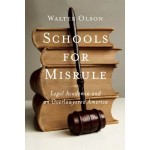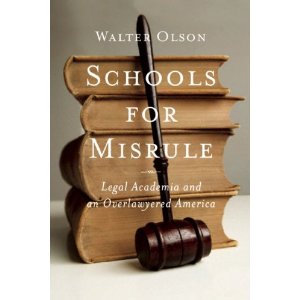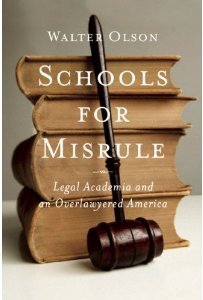- Making waves in the law blogs: critique of elite law schools’ continuing tendency to elevate theoretical over practical forms of scholarly work [Brent Evan Newton (Georgetown), SSRN, forthcoming in South Carolina Law
 Review; some reactions from Steve Bainbridge and, at Prawfsblawg, from Rick Garnett, Kristen Holmquist, and Paul Horwitz]. I argue along similar though not identical lines in the earlier chapters of my forthcoming book.
Review; some reactions from Steve Bainbridge and, at Prawfsblawg, from Rick Garnett, Kristen Holmquist, and Paul Horwitz]. I argue along similar though not identical lines in the earlier chapters of my forthcoming book. - Law schools inflate placement statistics by only interviewing alums who are employed [Above the Law] And does sheer spending dominate the U.S. News algorithm for ranking top law schools? [same]
- Calls grow for disclosing academic economists’ conflicts of interest [Salmon]. Will lawprofs’ be next?
- Rutgers-Newark law school clinic pursues long-shot lawsuit seeking to hold Iraq war unconstitutional [Jonathan Adler/Volokh]. If you’re a New Jersey taxpayer with doubts about whether you should be obliged to support such lawsuits, you may be one of those horrid meanies guilty of “‘kneecapping’ academic freedom” according to one not especially temperate defense of clinics’ work [Robert R. Kuehn and Peter A. Joy, AAUP] More: Adam Babich, “Controversy, Conflicts, and Law School Clinics” [SSRN via Legal Ethics Forum, and thanks for kind mention in latter]
- “Should Conservative and Libertarian Law Students Consider a Career in Legal Academia?” [David Bernstein/Volokh; some further thoughts from Paul Horwitz, Prawfs]
Posts Tagged ‘Schools for Misrule’
Schools for Misrule galleys are here

I’m delighted to announce that bound galleys of my forthcoming book on legal academia, Schools for Misrule, arrived last week from Encounter Books. Both Encounter and the Cato Institute have a limited number of these available for potential reviewers or others who may write about the book and its themes. (Or inquire about an advance PDF copy if you’re in this position.) And I’m further delighted to report that some blush-makingly favorable blurbs have already come in from well-known public figures and opinion makers who’ve had an advance look at the contents. I’ll share some of them in the weeks ahead.
Even before getting a copy of the book, law-blogger extraordinaire and leading corporate law scholar Prof. Stephen Bainbridge of UCLA did a wonderful post (thanks!) in which he called Overlawyered “one of the great voices in tort reform” and added, “I’ve preordered a copy from Amazon and am really looking forward to reading what I am sure will be an important critique of my chosen profession.” You can pre-order too.
“Law Schools Overwhelmingly Hire Liberals as Law Professors”
Pretty much confirming all the other numbers out there. It’s a bit too late for me to work it into Schools for Misrule — the text of which is ready to go to the printer any day now — but it’s not as if there’s much real dispute anyway about the leftward leanings of the contemporary American law lectern. [TaxProf; James Phillips and Douglas Spencer, “Ideological Diversity and Law School Hiring”]
Law schools roundup
- Yale Law School “a cult of the 14th Amendment… that happens to have a registrar’s office.” [Elizabeth Wurtzel, Above the Law]
- Admitted applicants up, near-term job prospects down: “The irresponsibility of law schools” [Brian Tamanaha, Balkinization; Annie Lowrey, Slate] Not new, but relevant to debate over unaffordable nature of law education: George Washington University law school trims night program so as to improve its U.S. News rankings [WSJ Law Blog]
- While serving as chief Congressional scold publicly blasting the banking industry, Harvard lawprof Elizabeth Warren also had a $90,000 consulting contract with class-action lawyers suing banks; with the notable exception of Richard Painter, few in the Washington conflict-of-interest industry or legal ethics community seem much bothered [Business Week, Examiner, Wash. Times] Should academics publicly disclose their consulting relationships? [Lawrence Cunningham, ConcurOp]
- Other protections for client confidentiality remain intact, of course: “N.J. Court Says Public Law-School Clinics Aren’t Immune From Open-Records Law” [Chronicle of Higher Education] “Federal employees volunteering for law clinics: What could go wrong?” [Wood, PoL]
- Egalitarian trappings aside, modern academia essentially embodies an older aristocratic ethos [Nate Oman, ConcurOp]
- Great news: several of the highest-profile names in public debates about our legal system have indicated their interest in providing blurbs for Schools for Misrule, now nearing publication.
International human rights roundup
Developments in an emerging area of law much explored in my forthcoming book:
- “Developing Countries Could Sue for Climate Action — Study” [NYT/ClimateWire] “Do We Need Global Governance To Combat Global Warming?” [Ilya Somin/Volokh]
- From UN and oddly uncontroversial Human Rights Watch, pressure on U.S. to alter labor law in union-friendly direction [ShopFloor, Chamber Post]
- Recent academic conferences: “2009 National Forum on the Human Right to Housing” [Nov. 2009, Georgetown Law] “International and Comparative Law Review Symposium on the significance of the United Nations Convention on the Rights of Persons with Disabilities” [Loyola L.A., Mar. 2010]
- At whose expense? “UN General Assembly Invents a Right to Water and Sanitation” [GGW, BoingBoing]
- Again, some survivors of U.S.S. Cole attack on U.S. military personnel sue government of Sudan [Jay Nordlinger/NRO “Corner”, related paper by Elizabeth Bahr, George Mason]
- Copying liberals’ homework, some anti-abortionists claim mantle of international human rights for their cause [NRO “Bench Memos,” approvingly, via Ku/OJ]
- “An Eminently Sound Approach to (Supposed) International Human Rights Norms, from the 9th Circuit” [Volokh]
- What Keynes knew: after 92 years, Germany finally pays off the last Versailles reparations [Marian Tupy, Cato at Liberty]
On the road: preparing Spring speaking/book tour
Last night I sent off the source notes for my forthcoming book Schools for Misrule: Legal Academia and an Overlawyered America, on track for publication by Encounter Books Feb. 15. Now it’s time to lay the plans (with help from Encounter and my own Cato Institute) for me to hit the road next year to address audiences at single-author events, panels and forums. Why not add your group or city to the tour? Email at [editor] – at – [thisdomainname] – dot – com and we’ll see what we can do. If you’re active with a chapter of the Federalist Society, contact the national office and they can help coordinate.
My new Cato podcast: human rights redefined
The other day the Obama administration came out with the first official U.S. response to the United Nations’ “periodic review” critique of human rights practices within the United States. To the surprise of many — though not of those who’ve been following this area carefully — it presented as human rights imperatives worthy of international attention a wide range of initiatives that would earlier have been seen as domestic policy matters, from ObamaCare (whose passage — including a penalty on individuals for failing to buy health insurance — it depicted as a human rights advance) to labor law (where it suggested that Congress might be putting the U.S. human rights record at risk if it declines to expand the organizing rights of labor unions).
One of the major themes of my forthcoming book Schools for Misrule is the role of thinkers in the law schools in preparing the way for new and transformed (and gravely mistaken) conceptions of international human rights. Today on the Cato Institute’s daily podcast series, Caleb Brown interviews me about the ongoing redefinition of international human rights and how we got to this point. The interview audio is available here.
My Cato Institute colleague Roger Pilon, who directs the Institute’s Center for Constitutional Studies and served under Reagan as policy director for the State Department’s office on human rights, has been active in recent days in advancing a critique of the Obama administration’s approach in a Philadelphia Inquirer op-ed as well as at Cato at Liberty.
And coincidentally: today’s NYT reports that George Soros is giving $100 million to Human Rights Watch, a group in the forefront of advancing novel human rights claims.
Ready, set, cringe
“US admits human rights shortcomings in UN report” [AP] Not to get too far ahead of the game, but the enthusiasm of legal academia for the international human rights movement is one of the major themes of my forthcoming Schools for Misrule, and the fruits of that movement — including the United Nations’ new “periodic review” procedure, by which it scrutinizes ours and other nations’ human rights records — figure prominently in the narrative.
More: Michael Cannon at Cato notes that the Obama administration cited, as evidence of the nation’s human rights progress, its enactment of “legislation that threatens U.S. residents with prison if they fail to purchase health insurance.”
Schools for Misrule cover art
Just out from Encounter Books, the cover art for my forthcoming book:

Apropos of which, one theme the book treats at length — the consequences and possible origins of today’s overwhelming liberal/Left ideological dominance in academic law — is the subject of Above the Law’s latest odd-trio matchup of Richard Epstein (at Ricochet), John Yoo (in comments there) and Elizabeth Wurtzel (on Twitter). Epstein:
…on average I would say that there are more left-wing democrats than center-left democrats [in legal academia]. I define the difference as follows. The former are those who have sympathy for programs of redistribution on such key areas as education and health care, but are by and large supportive of market institutions on the production side of the line. There is an effort to make good on the earlier social democratic tradition. The left democrats are in favor of a larger public sector and are deeply suspicious of markets more or less across the board. To put the point most vividly, the center left group is uncomfortable that Obama is too far to the left. The left liberal group is uncomfortable that he is too far to the right. There is a lot of difference there.
Yoo:
…conservatives, for good reason, tend to hide their political beliefs when they are on the job market and when they are untenured. They suspect, perhaps reasonably in light of this study, that there is a bias against them. I know conservatives at other schools who try to avoid writing on anything remotely controversial — this is bad for scholarship and teaching, because it discourages our best minds and fullest debates on the most important subjects.
Wurtzel:
Re liberal bias in academia: Shouldn’t the fact that intellectuals tend to be drawn to liberal ideas tell us that liberal ideas are smarter?
Well, no, as Hayek and many others have noted, it might just be that liberal/Left ideas unlike conservative ideas flatter intellectuals with the assurance that they deserve to run the world. Certainly — as I argue at more length in the new book — many of the liberal/Left ideas in circulation today promise to make legal academics a much more powerful and influential bunch.
Iroquois “passports”
According to news reports in recent days, some members of Iroquois Indian tribes are claiming a right to travel internationally on tribal “passports”, and U.S. officials — including Secretary of State Hillary Clinton, at the request of upstate Rep. Louise Slaughter and other New York politicos — have leaned over backwards to let them do so. As I relate in my forthcoming book, some Indian tribes in the U.S. have been getting louder in asserting that they have the rights and perquisites of actual state sovereignty — something U.S. Supreme Court precedent makes very clear they do not have — and have been invoking international human rights law, and its precepts in defense of the rights of indigenous peoples, in support of those vain claims. That seems to be going on to some extent here too.
The State Department has long accepted some casual use of tribal “passports” given a number of tribes’ geographic sprawl across the U.S.-Canada border (where until recently the paperwork burdens for travelers were minimal anyway). If it is now beginning to play along with bogus assertions of a right to use Indian passports in travel around the world, that would be big news. Let’s hope that’s not what the new reports mean.
